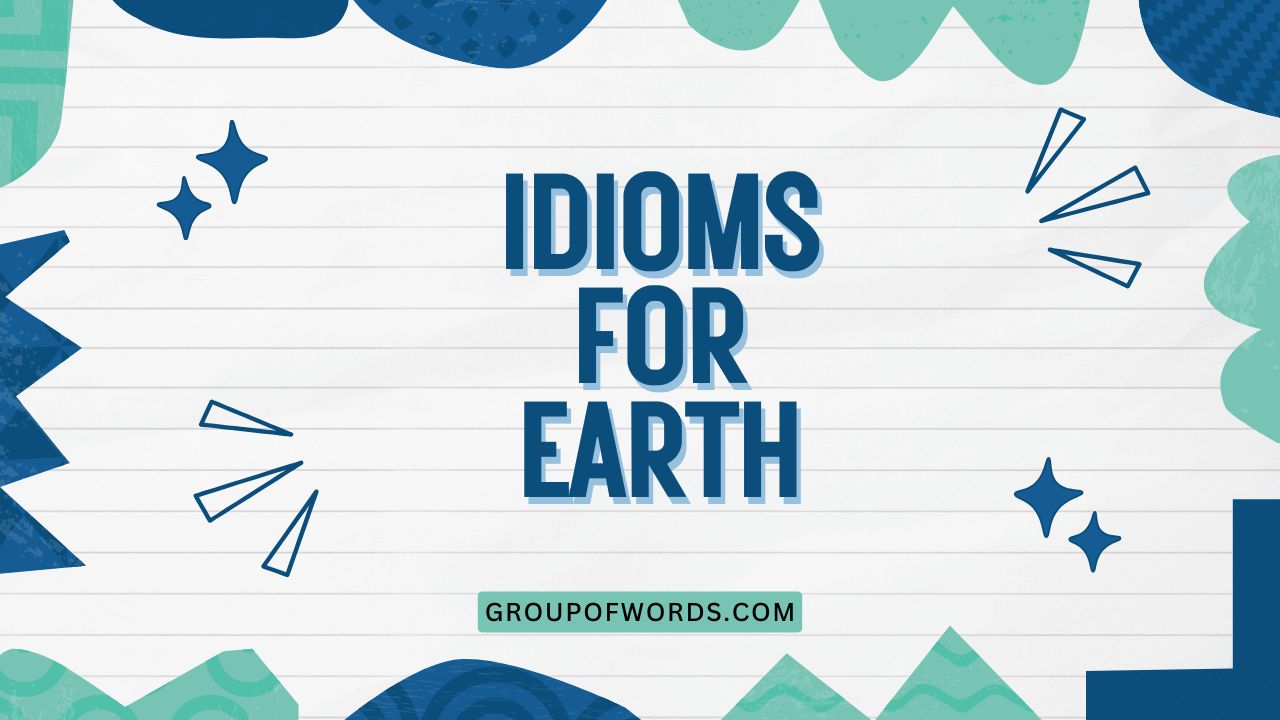Earth Idioms: Mastering Figurative Language
Idioms are an essential part of the English language, adding color and depth to our communication. Understanding idioms, particularly those related to the earth, enhances comprehension and fluency.
These expressions often carry cultural and historical significance, enriching our understanding of language. This article explores various idioms related to “earth,” providing definitions, examples, and practical exercises.
This guide is perfect for English language learners, teachers, and anyone looking to expand their vocabulary and improve their communication skills.
Table of Contents
- Introduction
- Definition of Earth Idioms
- Structural Breakdown
- Types and Categories of Earth Idioms
- Examples of Earth Idioms
- Usage Rules for Earth Idioms
- Common Mistakes with Earth Idioms
- Practice Exercises
- Advanced Topics
- Frequently Asked Questions
- Conclusion
Introduction
Idioms are phrases or expressions whose meanings cannot be understood from the ordinary meanings of the words within them. They are figurative language that adds richness and nuance to conversations and writing.
Earth idioms, specifically, use the concept of “earth” to convey deeper meanings about people, situations, and values. Learning these idioms not only expands vocabulary but also provides a window into cultural perspectives and linguistic creativity.
Understanding and using earth idioms correctly can significantly improve communication skills and comprehension of English.
Definition of Earth Idioms
An earth idiom is a phrase or expression that uses the word “earth” or concepts related to land, soil, or the planet to convey a meaning that is different from the literal definitions of the individual words. These idioms often describe characteristics, situations, or actions in a metaphorical or figurative way. Earth idioms are classified as figurative language, specifically under the broader category of idioms. Their function is to add color, depth, and cultural context to communication. They are used in various contexts, from casual conversations to formal writing, to express ideas in a more engaging and relatable manner.
Classification
Earth idioms can be classified based on their usage and the specific meaning they convey. Some common classifications include:
- Descriptive idioms: Describe qualities or characteristics of people or things (e.g., “down-to-earth”).
- Action-oriented idioms: Describe actions or efforts undertaken (e.g., “move heaven and earth”).
- Exaggerative idioms: Emphasize the significance or impact of something (e.g., “earth-shattering”).
- Cost-related idioms: Relate to the expense or value of something (e.g., “cost the earth”).
Function
The primary function of earth idioms is to enrich communication by providing a figurative way to express ideas. They can:
- Add emphasis: Make a statement more impactful.
- Provide clarity: Simplify complex ideas through relatable imagery.
- Reflect cultural values: Convey shared understandings and perspectives.
- Engage the audience: Make communication more interesting and memorable.
Contexts
Earth idioms are used in a wide range of contexts, including:
- Daily conversations: In casual discussions among friends, family, and colleagues.
- Literature: In novels, poems, and short stories to add depth and imagery.
- Journalism: In news articles and opinion pieces to engage readers.
- Business communications: In presentations, reports, and marketing materials.
- Academic writing: In essays and research papers to explain concepts effectively (though sparingly).
Structural Breakdown
The structure of earth idioms typically involves a combination of common English words arranged in a specific order to create a figurative meaning. Understanding the structure helps in recognizing and interpreting these idioms.
Here’s a breakdown of the structural elements:
- Core Word: The word “earth” is central to these idioms.
- Modifiers: Adjectives, adverbs, or prepositions that add to the meaning.
- Verbs: Action words that describe what is happening in the idiom.
- Prepositional Phrases: Phrases that provide context or direction.
For example, in the idiom “down-to-earth,” “down” is a preposition that modifies “earth,” and the entire phrase describes someone’s personality. In “move heaven and earth,” “move” is the verb, and “heaven and earth” are the objects being moved, representing a significant effort.
The structure is not always literal; it’s the combination of words that gives the idiom its unique meaning.
Types and Categories of Earth Idioms
Earth idioms can be categorized based on the specific meanings they convey and the contexts in which they are used. Here are some common types:
Down to Earth
Meaning: Practical, realistic, and sensible.
Usage: Describes someone who is approachable, grounded, and not pretentious.
Salt of the Earth
Meaning: A person or people considered to be the best, most admirable, or essential.
Usage: Describes honest, reliable, and hardworking individuals.
Cost the Earth
Meaning: To be very expensive.
Usage: Describes something that is prohibitively costly.
End of the Earth
Meaning: A very remote or distant place.
Usage: Describes a location that is far away and difficult to reach.
Move Heaven and Earth
Meaning: To do everything possible to achieve something.
Usage: Describes making a great effort to accomplish a goal.
Run to Earth
Meaning: To find someone or something after a long search.
Usage: Describes discovering or locating something that was previously hidden or lost.
Earth-Shattering
Meaning: Extremely surprising or shocking.
Usage: Describes news or events that are profoundly impactful or transformative.
On Earth
Meaning: Used to express surprise, disbelief, or emphasis.
Usage: Often used in questions or exclamations to convey strong emotion.
Examples of Earth Idioms
The following tables provide extensive examples of earth idioms, categorized by their specific meaning and usage. Each example is presented in a sentence to illustrate its proper context.
Down to Earth Examples
The following table presents examples of the idiom “down to earth.” This idiom is used to describe someone who is practical, realistic, and sensible.
| Example | Explanation |
|---|---|
| Despite her fame, she remains very down to earth. | She is approachable and not arrogant. |
| He’s a down to earth kind of guy who enjoys simple pleasures. | He appreciates ordinary things. |
| Her down to earth advice helped me make the right decision. | Her advice was practical and sensible. |
| The teacher’s down to earth approach made the students feel comfortable. | The teacher was approachable and relatable. |
| We need a down to earth leader who understands the needs of the community. | We need a leader who is practical and realistic. |
| His down to earth attitude is refreshing in this industry. | His practicality is appreciated. |
| She gave a down to earth presentation that everyone understood. | The presentation was clear and easy to follow. |
| The architect’s design was both innovative and down to earth. | The design was practical and functional. |
| He’s a down to earth person who doesn’t let success go to his head. | He remains humble despite his achievements. |
| Her down to earth personality makes her easy to get along with. | She is friendly and approachable. |
| The CEO’s down-to-earth communication style resonated well with the employees. | The CEO’s style was simple and relatable. |
| His down to earth explanation of the complex problem made it easy to understand. | His explanation was straightforward and practical. |
| She’s a down to earth mother who always puts her children first. | She is a practical and loving mother. |
| His down to earth perspective helped the team find a realistic solution. | His perspective was grounded and sensible. |
| The politician’s down to earth promises appealed to the working class. | The promises were realistic and achievable. |
| Despite his wealth, he lives a down to earth lifestyle. | He lives simply and without extravagance. |
| Her down to earth advice was exactly what I needed to hear. | Her advice was practical and helpful. |
| The company needs a down to earth strategy to survive the economic downturn. | The strategy needs to be realistic and practical. |
| His down to earth nature makes him a trustworthy friend. | He is reliable and genuine. |
| The counselor’s down to earth approach helped the patient open up. | The counselor was approachable and understanding. |
| She’s a very down-to-earth person, always ready to lend a hand. | She’s practical and helpful. |
| His down-to-earth wisdom comes from years of experience. | His wisdom is practical and based on real-world knowledge. |
| The project requires a down-to-earth and pragmatic approach. | The project needs a realistic and practical strategy. |
Salt of the Earth Examples
The following table provides examples of the idiom “salt of the earth.” This idiom is used to describe honest, reliable, and hardworking individuals.
| Example | Explanation |
|---|---|
| Farmers are often considered the salt of the earth. | Farmers are seen as honest and hardworking. |
| She’s the salt of the earth, always helping those in need. | She is a kind and generous person. |
| The volunteers were truly the salt of the earth, dedicating their time to the community. | The volunteers were admirable and essential to the community. |
| He’s a simple man, but he’s the salt of the earth. | He is honest and reliable, despite his simplicity. |
| My grandparents were the salt of the earth, teaching me the value of hard work. | They were honest and hardworking role models. |
| The community is built on the backs of the salt of the earth. | The community relies on honest and hardworking individuals. |
| These hardworking immigrants are the salt of the earth. | These immigrants are valuable and essential to society. |
| The nurses in this hospital are truly the salt of the earth. | The nurses are dedicated and compassionate. |
| He’s a no-nonsense guy, the salt of the earth type. | He is straightforward and reliable. |
| We need more people who are the salt of the earth in politics. | We need more honest and reliable politicians. |
| She’s the kind of person who’s just salt of the earth – always there for you. | She’s reliable and supportive. |
| The old miners were the real salt of the earth, tough and resilient. | They were hardworking and enduring. |
| He comes from a long line of farmers, all salt of the earth. | His family has a history of honesty and hard work. |
| The local shopkeepers are the salt of the earth, always friendly and helpful. | They are kind and supportive members of the community. |
| She’s a true salt of the earth woman, honest and compassionate. | She is genuine and caring. |
| The construction workers are the salt of the earth, building our cities. | They are essential and hardworking contributors to society. |
| He’s a salt of the earth kind of neighbor, always willing to lend a hand. | He is helpful and reliable. |
| The teachers in rural schools are often the salt of the earth. | They are dedicated and essential to their communities. |
| These volunteers are the salt of the earth, giving their time and energy to help others. | They are selfless and generous. |
| He is the salt of the earth; you can always count on him. | He is dependable and trustworthy. |
| Those hardworking farmers are the salt of the earth of this community. | They are the backbone of the community. |
| The nurses who dedicate themselves to caring for others are the salt of the earth. | They are the most admirable people. |
| My grandfather, a carpenter who built houses with his own hands, was truly the salt of the earth. | He was known for his honesty and hard work. |
Cost the Earth Examples
The following table illustrates the idiom “cost the earth.” This idiom is used to describe something that is very expensive.
| Example | Explanation |
|---|---|
| Buying a house in London can cost the earth. | Houses in London are very expensive. |
| That designer handbag must have cost the earth. | The handbag was likely very expensive. |
| Renovating the old building will cost the earth. | The renovation will be very costly. |
| Going to that exclusive resort will cost the earth. | The resort is prohibitively expensive. |
| Maintaining a luxury yacht can cost the earth. | Yachts are very expensive to maintain. |
| Private education for all three children is going to cost the earth. | Private education is extremely expensive. |
| Replacing the entire roof of the house will cost the earth. | The roof replacement is very costly. |
| The new software license cost the earth, but it’s worth it for the efficiency. | The license was very expensive. |
| That vintage car must have cost the earth to restore. | The restoration was likely very expensive. |
| Attending that prestigious university will cost the earth. | The university is extremely expensive. |
| The medical bills from his accident cost the earth. | The medical bills were incredibly high. |
| Building a custom home cost the earth, but it was exactly what they wanted. | Building the home was extremely expensive. |
| The legal fees for the lawsuit cost the earth. | The legal fees were very high. |
| Replacing all the windows in the house will cost the earth. | The window replacement is very costly. |
| The repairs to the storm-damaged property cost the earth. | The repairs were extremely expensive. |
| The latest smartphone cost the earth, but it has all the newest features. | The smartphone was prohibitively expensive. |
| Getting tickets to that exclusive event cost the earth. | The tickets were very expensive. |
| The vintage wine collection cost the earth to acquire. | Acquiring the collection was extremely expensive. |
| “Investing in that new technology might cost the earth, but it’s crucial for our company’s future.” | The new technology is extremely expensive. |
| “Upgrading to the latest software version cost the earth, but it improved our productivity significantly.” | The software upgrade was costly. |
| “That new electric car seems amazing, but it probably costs the earth.” | The electric car is likely very expensive. |
| “Maintaining a large garden like that must cost the earth in terms of labor and resources.” | Maintaining the garden is very expensive. |
| “The security system they installed cost the earth, but it gives us peace of mind.” | The security system was prohibitively expensive. |
End of the Earth Examples
The following table provides examples of the idiom “end of the earth.” This idiom is used to describe a very remote or distant place.
| Example | Explanation |
|---|---|
| They live in a small village at the end of the earth. | They live in a very remote place. |
| He traveled to the end of the earth to find peace. | He went to a very distant location. |
| That restaurant is located at the end of the earth, but the food is amazing. | The restaurant is in a remote location. |
| I wouldn’t want to live at the end of the earth, I prefer city life. | I don’t want to live in a remote area. |
| The research station is located at the end of the earth, far from civilization. | The station is in a very isolated location. |
| She moved to the end of the earth to escape her past. | She moved to a remote location to start over. |
| The only way to reach the village is by boat, it’s practically at the end of the earth. | The village is very difficult to access. |
| He felt like he was at the end of the earth when he got lost in the desert. | He felt isolated and far from help. |
| The abandoned mine is at the end of the earth, no one goes there anymore. | The mine is in a very remote and deserted location. |
| They decided to build their cabin at the end of the earth, surrounded by nature. | They wanted to live in a secluded and natural environment. |
| “The expedition team ventured to what felt like the end of the earth in search of rare artifacts.” | The team went to a very remote and unexplored place. |
| “After years of working in the city, he decided to retire to a quiet cottage at the end of the earth.” | He moved to a very remote and peaceful location. |
| “The small, isolated community felt like it was at the end of the earth, disconnected from the rest of the world.” | The community was very remote and isolated. |
| “The explorers were determined to reach the end of the earth, no matter the challenges they faced.” | The explorers were determined to reach a very remote and challenging location. |
| “The artist sought inspiration by traveling to the end of the earth, where the landscapes were untouched and raw.” | The artist went to a very remote and unspoiled place. |
| “Living in that remote cabin felt like living at the end of the earth, with no neighbors for miles.” | Living in the cabin felt very isolated and remote. |
| “The research team set up their base camp at what seemed like the end of the earth, in the heart of the Antarctic wilderness.” | The base camp was in a very remote and harsh location. |
| “The old lighthouse stood at the end of the earth, guiding ships through treacherous waters.” | The lighthouse was in a very remote and dangerous location. |
| “He felt like he was at the end of the earth when his car broke down in the middle of nowhere.” | He felt isolated and stranded. |
| “They hiked for days until they reached what seemed like the end of the earth, a hidden valley untouched by civilization.” | They reached a very remote and pristine location. |
| “The only way to find true solitude is to travel to the end of the earth and disconnect from the noise of the world.” | True solitude requires going to a very remote place. |
| “She decided to open a small cafe at the end of the earth, hoping to attract adventurous travelers and locals alike.” | She opened the cafe in a very remote location. |
| “The scientists conducted their experiments at the end of the earth to study the effects of extreme isolation on the human psyche.” | The experiments were conducted in a very remote and isolated environment. |
Usage Rules for Earth Idioms
Using earth idioms correctly involves understanding the context and the figurative meaning of the expression. Here are some rules to follow:
- Understand the Meaning: Ensure you know the precise meaning of the idiom before using it.
- Consider the Context: Use idioms in appropriate situations. Some idioms are informal and not suitable for formal writing.
- Use Correctly: Avoid altering the wording of the idiom, as this can change its meaning or make it nonsensical.
- Audience Awareness: Be mindful of your audience. Some idioms may not be familiar to non-native speakers or people from different cultural backgrounds.
For example, using “down to earth” to describe a humble person is correct, but saying “up to earth” would be incorrect and confusing. Similarly, using “cost the earth” in a formal business report might be inappropriate; a more formal phrase like “very expensive” would be better.
Common Mistakes with Earth Idioms
Many learners make common mistakes when using earth idioms. Here are some frequent errors and how to avoid them:
| Incorrect | Correct | Explanation |
|---|---|---|
| He is very up to earth. | He is very down to earth. | “Down to earth” is the correct idiom. |
| It cost all the earth. | It cost the earth. | “The earth” is the correct phrase. |
| Move the world and heaven. | Move heaven and earth. | The order of “heaven and earth” is fixed. |
| Salt from the earth. | Salt of the earth. | “Of” is the correct preposition. |
| The end of world. | The end of the earth. | Correct idiom is “end of the earth”. |
Another common mistake is using idioms out of context. For example, using “cost the earth” in a situation where something is only moderately expensive would be an exaggeration and could confuse the listener.
Always consider the specific situation and choose idioms that accurately reflect the intended meaning.
Practice Exercises
Test your understanding of earth idioms with these practice exercises. Fill in the blanks with the correct idiom from the list below:
Idiom List: down to earth, salt of the earth, cost the earth, end of the earth, move heaven and earth, earth-shattering.
| Question | Answer |
|---|---|
| 1. She is very __________, always ready to help others. | down to earth |
| 2. Buying a new car can __________. | cost the earth |
| 3. He promised to __________ to find her lost dog. | move heaven and earth |
| 4. The news of the discovery was __________. | earth-shattering |
| 5. My grandparents were the __________ of our family. | salt of the earth |
| 6. They live in a small village at the __________. | end of the earth |
| 7. To succeed in this industry, you need to be _________ and practical. | down to earth |
| 8. The community relies on the _________ to keep it running. | salt of the earth |
| 9. That designer dress must have __________. | cost the earth |
| 10. The explorer ventured to the __________ in search of new discoveries. | end of the earth |
Exercise 2: Choose the correct idiom to complete each sentence.
| Question | Options | Answer |
|---|---|---|
| 1. Despite his wealth, he remains __________. | (a) up to earth (b) down to earth (c) around the earth | (b) down to earth |
| 2. Getting that promotion will __________. | (a) move the sky (b) cost the earth (c) run to heaven | (b) cost the earth |
| 3. She’s the __________ kind of person, always reliable. | (a) salt of the sea (b) salt of the earth (c) pepper of the earth | (b) salt of the earth |
| 4. The news of the earthquake was truly __________. | (a) ground-breaking (b) earth-shattering (c) world-moving | (b) earth-shattering |
| 5. They went to the __________ to find a quiet place to retire. | (a) end of the city (b) end of the street (c) end of the earth | (c) end of the earth |
| 6. He promised to __________ to get the project done on time. | (a) move mountains (b) move heaven and earth (c) move the sky | (b) move heaven and earth |
| 7. She’s very _________ in her approach to solving problems. | (a) down to moon (b) down to sky (c) down to earth | (c) down to earth |
| 8. The farmers in this region are the true __________. | (a) sugar of the earth (b) salt of the earth (c) spice of the earth | (b) salt of the earth |
| 9. Buying a new car these days can really __________. | (a) cost the stars (b) cost the moon (c) cost the earth | (c) cost the earth |
| 10. The explorers traveled to the _________ in search of undiscovered lands. | (a) end of the city (b) end of the earth (c) end of the galaxy | (b) end of the earth |
Advanced Topics
For advanced learners, understanding the nuances and origins of earth idioms can provide a deeper appreciation of the English language. Many idioms have historical or cultural roots that explain their figurative meanings.
For example, “salt of the earth” comes from the Bible, where salt was a valuable commodity used for preserving food and symbolizing worth. Understanding these etymological connections can enhance comprehension and usage.
Moreover, exploring variations and adaptations of earth idioms in different dialects and regions can be a fascinating study. While the core meanings remain consistent, the specific wording or usage may differ.
Analyzing these variations can provide insights into regional linguistic differences and cultural influences.
Frequently Asked Questions
- What is an idiom?
An idiom is a phrase or expression whose meaning cannot be understood from the literal meanings of the words it contains. It’s a figurative expression with a culturally understood meaning.
- Why are idioms important?
Idioms add color, depth, and nuance to language. They help convey complex ideas in a more engaging and relatable manner and are essential for understanding native speakers.
- How can I learn idioms effectively?
Learn idioms through context, using flashcards, and practicing them in conversations and writing. Exposure to English media (books, movies, TV shows) also helps.
- Are idioms the same in all languages?
No, idioms are language-specific and often culturally bound. Direct translations rarely work, as the figurative meanings are unique to each language.
- What does “down to earth” mean?
“Down to earth” means practical, realistic, and sensible. It describes someone who is approachable and not pretentious.
- When can I use the idiom “cost the earth”?
You can use “cost the earth” when something is very expensive or prohibitively costly.
- What is the origin of the idiom “salt of the earth”?
The idiom “salt of the earth” originates from the Bible, where salt was a valuable commodity, symbolizing worth and preservation.
- How can I avoid misusing idioms?
Always understand the meaning and context of an idiom before using it. Practice using idioms in different situations and seek feedback from native speakers.
Conclusion
Mastering earth idioms is a valuable step in enhancing your English language skills. These expressions add color and depth to your communication, allowing you to express ideas more effectively and understand native speakers better.
By understanding the definitions, usage rules, and common mistakes associated with these idioms, you can confidently incorporate them into your vocabulary.
Continue practicing and expanding your knowledge of idioms to further improve your fluency and comprehension. Remember that language learning is an ongoing process, and each new idiom you learn brings you one step closer to mastering the English language.
Embrace the challenge and enjoy the richness that idioms bring to your communication.






